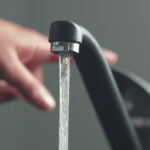No one wants to wait around for their hot water supply, and you’re probably wondering what’s going on if long waiting periods have begun to show up for some of your home’s hot water fixtures. Why is a given shower, tub or any other fixture taking so long for water to heat up?
At Action Plumbing, Heating, Air & Electric, we’re here to help. We offer a huge variety of water heater repair and replacement services, including offering high-quality tankless water heaters that provide water on-demand so you’re never stuck waiting for a slow heating process again. There are several reasons you may be experiencing slowness with your hot water heater, some of which can be easily remedied while others tie back to installation or related themes. This two-part blog will dig into everything you need to know in this realm.
Simple Distance Themes
In some cases, particularly in larger homes or areas where significant plumbing pipes are required to transport water from the heater to the fixture that requires it, the reason for slow heating traces back to this distance. It simply takes a bit longer for hot water to make its way through a longer set of pipes to a distant faucet or showerhead.
Homeowners in this situation often find numerous benefits from a tankless water heater installation. Instead of having to wait for water to travel through pipes, this system provides hot water on-demand for all your fixtures immediately.
Sediment Buildup
Maybe the most common issue that leads to slow hot water delivery, and luckily one that’s easily remedied, is the buildup of sediment and minerals in your water heater tank. Various loose minerals will be present in the water, sinking and settling at the bottom of your tank. When this reaches a significant enough point, this sediment will block the hot water outlet pipe either partially or even completely, stopping hot water from flowing out at the normal rate. This sediment will also block heat transfer from the heating element to the water itself.
As we noted, however, sediment buildup can be removed. Just call our plumbers to flush your water heater and drain this sediment.
Volume Restrictor
In other cases, you may have some kind of volume restrictor present on various fixtures in your home. A good example here is a low-flow showerhead, which is meant to lower the amount of water pressure and overall water used – but in some cases, it may not be working properly and could lead to issues with hot water flow and timing. In these situations, our plumbers will usually be able to make some basic tweaks to any restrictors in place to solve the problem.
For more on the potential causes of slow hot water in your fixtures, or to learn about any of our plumbing or HVAC services, speak to the staff at Action Plumbing, Heating, Air & Electric today.


